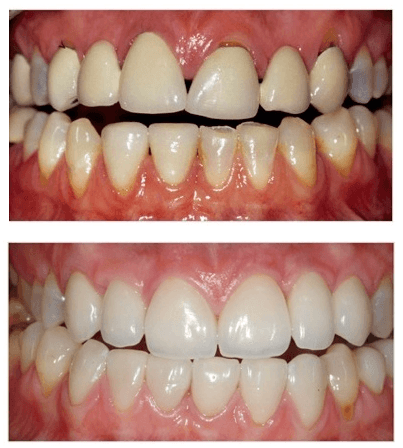Periodontal disease, also known as gum disease, is a common oral health condition that affects millions of people worldwide. It is a progressive infection and inflammation of the gums and the bone that supports the teeth. Left untreated, it can lead to serious complications, including tooth loss.
In this comprehensive guide, we will explore the different stages of periodontal disease, its symptoms, treatment options, and how long you can expect to keep your teeth with this condition.
Understanding Periodontal Disease
What is Periodontal Disease?
Periodontal disease, or gum disease, is an inflammatory condition that affects the gums and the tissues surrounding the teeth. It is primarily caused by the buildup of plaque, a sticky film of bacteria that forms on the teeth. When plaque is not removed through proper oral hygiene practices, it can harden into tartar, leading to gum inflammation and infection.
Common Symptoms of Periodontal Disease
Recognising the early signs of periodontal disease is crucial for timely intervention. Some common symptoms include:
- Red, swollen, or tender gums
- Bleeding gums, especially during brushing or flossing
- Persistent bad breath
- Receding gums, causing teeth to appear longer
- Loose or shifting teeth
- Changes in the way your teeth fit together when you bite
The Stages of Periodontal Disease
Periodontal disease progresses in stages, which range from mild to advanced. Understanding these stages can help you gauge the severity of the condition and seek appropriate treatment.
- Gingivitis: This is the earliest stage of periodontal disease and is characterised by red, swollen gums that may bleed easily. At this stage, the damage is reversible with proper treatment and oral hygiene practices.
- Mild Periodontitis: In this stage, the infection has spread beneath the gums, affecting the supporting bone. Pockets may form between the teeth and gums, allowing plaque and bacteria to accumulate.
- Moderate Periodontitis: Without intervention, the infection progresses, leading to further damage to the ligaments, soft tissues, and bone supporting the teeth. Symptoms may include bad breath, pus around the gum line, and pain.
- Advanced Periodontitis: At this stage, there is significant bone loss, causing teeth to become loose and potentially leading to tooth loss. Treatment aims to manage the condition and prevent further deterioration.
Causes and Risk Factors
Factors that Increase the Risk of Periodontal Disease
While poor oral hygiene is a significant contributing factor to periodontal disease, certain risk factors can increase your susceptibility to the condition. These include:
- Smoking or tobacco use: Tobacco use weakens the immune system and makes it harder for the gums to heal.
- Diabetes: If you have diabetes, you are more prone to infections, including gum disease.
- Hormonal changes: Hormonal fluctuations during puberty, pregnancy, and menopause can make gums more sensitive and prone to inflammation.
- Genetic predisposition: If you have a genetic predisposition to gum disease, you can be more susceptible to the condition.
- Certain medications: Certain medications, such as oral contraceptives and anticonvulsants, can increase the risk of gum disease.
- Poor nutrition: A diet lacking in essential nutrients can weaken the immune system and compromise gum health.
Is Periodontal Disease Contagious?
The bacteria that cause gum disease can be transmitted from person to person through saliva. Although casual contact does not typically lead to transmission, repeated and long-term exposure to an infected individual’s saliva, such as through kissing, can increase the risk of developing periodontal disease.
Diagnosis and Treatment
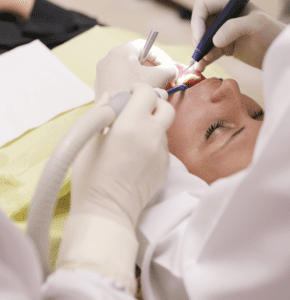
How is Periodontal Disease Diagnosed?
Early detection and diagnosis of periodontal disease are vital for effective treatment. During a dental examination, your dentist will assess the health of your gums and teeth, looking for signs of inflammation, recession, and plaque buildup. They may also measure the depth of the pockets around your teeth using a periodontal probe.
In some cases, dental X-rays may be taken to evaluate the extent of bone loss and identify any underlying issues. Your dentist may refer you to a periodontist, a specialist in gum disease, for further evaluation and treatment.
Treatment Options for Periodontal Disease
The treatment approach for periodontal disease depends on the severity of the condition. Early-stage gum disease, such as gingivitis, can often be managed and reversed with professional dental cleaning and improved oral hygiene practices.
For more advanced cases, treatment options may include:
- Scaling and root planing: Also known as deep cleaning, this procedure involves removing plaque and tartar from below the gumline and smoothing the root surfaces to promote healing and prevent bacterial growth.
- Pocket reduction surgery: In cases where pockets have formed between the teeth and gums, a periodontist may perform surgery to access and clean these areas. This procedure helps reduce pocket depth and prevent further progression of the disease.
- Dental bone grafting: If bone loss has occurred due to periodontal disease, a bone graft may be necessary to stimulate new bone growth and restore the structure of the jawbone.
- Gum grafting: In cases of severe gum recession, gum grafting can be performed to cover exposed tooth roots and protect them from further damage.
- Antibiotics: In some instances, antibiotics may be prescribed to control bacterial infection and reduce inflammation.
The Importance of Regular Dental Visits
Regular dental visits are essential for monitoring the progress of periodontal disease and ensuring proper treatment. Your dentist will perform routine cleanings to remove plaque and tartar buildup, as well as assess the health of your gums and teeth. They may also recommend additional treatments or refer you to a periodontist if necessary.
During these visits, it is important to communicate any changes or concerns you may have regarding your oral health. Your dentist can provide guidance on maintaining proper oral hygiene and offer personalised recommendations based on your specific needs.
The Impact of Periodontal Disease on Tooth Loss
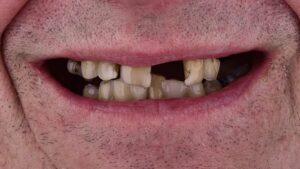
Can You Keep Your Teeth with Periodontal Disease?
The impact of periodontal disease on tooth loss varies depending on the severity of the condition and the effectiveness of treatment. With early detection and appropriate intervention, it is possible to manage gum disease and preserve your natural teeth for many years.
However, if periodontal disease progresses to advanced stages, tooth loss may become inevitable. The destruction of the supporting structures of the teeth, including the gums and bone, can weaken their stability, leading to loosening and eventual loss.
Factors that Influence Tooth Loss
Several factors can influence the likelihood of tooth loss if you have periodontal disease. These include:
- Severity of the disease: The more advanced the periodontal disease, the higher the risk of tooth loss.
- Response to treatment: Timely and effective treatment can slow down the progression of gum disease and preserve teeth.
- Oral hygiene practices: Consistent and thorough oral hygiene practices can help prevent further damage to the teeth and gums.
- Overall health: Certain systemic conditions, such as diabetes or immune disorders, can affect the body’s ability to fight off infections, including gum disease.
Dental Implants and Periodontal Disease
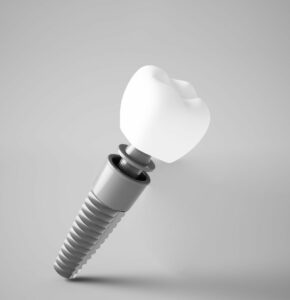
Can You Get Dental Implants with Periodontal Disease?
Dental implants are a popular option for replacing missing teeth. However, if you have periodontal disease, you may have concerns about your eligibility for dental implant placement.
In cases of mild to moderate periodontal disease, it is often possible to receive dental implants after undergoing appropriate treatment. However, it is crucial to address the gum disease first to ensure the success and longevity of the implants.
Requirements for Dental Implants with Periodontal Disease
Before considering dental implants, if you have periodontal disease, you must meet certain requirements to ensure a favourable outcome. These include:
- Successful treatment of periodontal disease: Active gum disease should be treated and brought under control before implant placement.
- Good oral hygiene: Maintaining excellent oral hygiene is essential to prevent the recurrence of gum disease and maintain the health of the surrounding tissues.
- Adequate bone support: Sufficient bone density and volume are necessary to support the dental implants. In cases of severe bone loss, additional procedures such as bone grafting may be required.
- Regular follow-up visits: Regular dental visits and follow-up appointments are crucial to monitor the health of the implants and ensure their long-term success.
Preventing Periodontal Disease
Tips for Preventing Periodontal Disease
Prevention is key when it comes to periodontal disease. Here are some tips to help you maintain optimal oral health and reduce your risk of gum disease:
- Practise good oral hygiene: Brush your teeth at least twice a day, floss daily, and use mouthwash to remove plaque and bacteria.
- Quit smoking: Smoking is a significant risk factor for gum disease. Quitting smoking can improve your oral health and overall well-being.
- Eat a balanced diet: A diet rich in fruits, vegetables, and whole grains provides essential nutrients for gum health.
- Limit sugary and acidic foods: These can contribute to the growth of harmful bacteria and increase the risk of tooth decay and gum disease.
- Drink plenty of water: Water helps rinse away food particles and bacteria, promoting a healthier oral environment.
- Manage stress: Chronic stress can weaken the immune system and increase the risk of gum disease. Find healthy ways to manage stress, such as exercise, meditation, or hobbies.
Lifestyle Changes to Promote Oral Health
In addition to maintaining good oral hygiene, certain lifestyle changes can contribute to better your oral health:
- Limit alcohol consumption: Excessive alcohol consumption can affect the health of your gums and increase the risk of gum disease.
- Manage chronic conditions: Conditions such as diabetes or autoimmune disorders can affect oral health. Proper management of these conditions is essential.
- Stay hydrated: Dry mouth can contribute to gum disease. Drink plenty of water throughout the day to keep your mouth moist.
- Avoid teeth grinding: Teeth grinding can damage the gums and teeth. If you grind your teeth, speak to your dentist about treatment options, such as a mouthguard.
The Importance of Early Intervention
The Benefits of Early Detection and Treatment
Early intervention is crucial in managing periodontal disease effectively. Detecting and treating gum disease in its early stages offers several benefits, including:
- Reversibility: Gingivitis, the earliest stage of gum disease, is reversible with proper treatment and oral hygiene practices.
- Reduced risk of tooth loss: Timely intervention can prevent further damage to the supporting structures of the teeth, reducing the risk of tooth loss.
- Improved oral health: Addressing gum disease early can help maintain healthy gums, prevent bad breath, and promote overall oral health.
- Lower treatment costs: Treating gum disease in its early stages is generally less invasive and costly compared to advanced cases.
Seeking Professional Help
If you suspect you may have periodontal disease or are experiencing symptoms such as bleeding gums, bad breath, or loose teeth, it is essential to seek professional help. Your dentist or periodontist can assess your oral health, provide a proper diagnosis, and recommend appropriate treatment options.
Remember, early detection and intervention can significantly improve the outcomes and long-term prognosis of gum disease.
Research and Advancements in Periodontal Disease
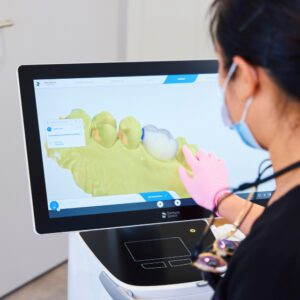
Recent Developments in Periodontal Disease Research
Ongoing research into periodontal disease aims to improve our understanding of the condition and develop more effective treatments. Some recent developments in periodontal disease research include:
- Targeted antimicrobial therapies: Researchers are exploring the use of specific antimicrobial agents to target and eliminate the bacteria responsible for gum disease while minimising harm to beneficial oral bacteria.
- Regenerative treatments: Scientists are investigating techniques to regenerate lost gum and bone tissue using growth factors, stem cells, and tissue engineering approaches.
- Personalised treatment strategies: Advances in genetics and microbiome research may lead to personalised treatment plans tailored to an individual’s specific risk factors and oral microbiota.
Promising Treatments on the Horizon
While more research is needed, there are promising treatment options on the horizon for periodontal disease. These include:
- Laser therapy: Laser-assisted treatments, such as LANAP (Laser-assisted new attachment procedure), show promise in treating gum disease with minimal invasiveness and faster healing times.
- Host modulation therapies: Modulating the host response to gum disease, such as using certain medications, may aid in managing the inflammatory process and preventing further damage.
- Advanced diagnostics: Advances in diagnostic tools, such as salivary testing and genetic screenings, may enable earlier detection and more targeted treatment of periodontal disease.
Treating Your Periodontal Disease
Periodontal disease is a common oral health condition that requires prompt attention and proper management to prevent further complications. With early detection, appropriate treatment, and diligent oral hygiene practices, you can maintain your natural teeth for many years, even with periodontal disease. Remember to schedule regular dental check-ups, follow your dentist’s recommendations, and seek professional help if you notice any signs or symptoms of gum disease.
By prioritising your oral health and taking proactive measures, you can enjoy a healthy smile for a lifetime. Here at the Melbourne Dental Implant & Sleep Centre, we’re here to help you. Contact us today on 1800 IMPLANT to schedule a consultation.

